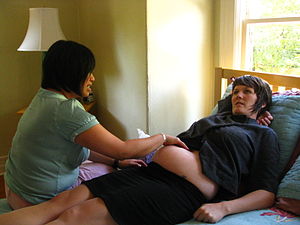
If you have experienced prenatal care, birth, and postpartum care from a midwife, you know the importance of this one-to-one relationship.
The experience with a midwife is beautiful. It is about love and compassion.
What more could you want or expect when bringing a baby into this world?
Great Britain’s National Health Service (NHS) includes the employment of midwives, yet increasing birth rates is causing a severe shortage.
The Ecologist explains:
UK midwifery is undergoing a crisis in numbers and identity. The decline in one-on-one care for women before, during and after labour has had a number of profound implications including a rising number of interventions in birth, an increase in caesarian sections and declining rates of breastfeeding.
The birth rate in England climbed steadily by 15 per cent between 2001 and 2010 , with predictions for a further five per cent rise over the next five years. Cathy Warwick, General Secretary of the Royal College of Midwives has lodged a petition with Parliament calling on the Government to recruit an extra 5,000 midwives into the NHS in England to fill a ‘desperate shortfall’. Since 2010, there have been another 896 new midwives, – to add to a total of 21,000 – but the number of births in England are expected to climb from 687,007 this year to 723,000 by 2014-15.
‘Our argument is that the work has increased to such an extent now that midwives really can’t offer the highest quality care that women in this country should certainly be able to expect. That matters because there is now an increasing body of evidence that indicates that aspects of care which midwives specifically offer are really important to high quality outcomes,’ she says.
I feel Warwick’s last statement is very important and speaks to the irony of midwifery criticism.
Midwives do offer the highest quality care for women that result in the highest quality outcomes.
A petition has been created for the NHS to recruit 5000 more midwives by Warwick.
One of the most obvious negative effect of the shortage of midwives is the rising caesarian rates in England: from 12 percent in 1990 to 25 percent in 2005. Obviously, surgical births cost more than vaginal births, which should be of great concern for a system of socialized medicine.
It’s not just caesarian rates that have been effected by the UK’s midwifery crisis, but breastfeeding rates are declining as a result as well. The Ecologist continues:
Sarah Montagu, admin secretary at the Association of Radical Midwives (ARM) and a practicing independent midwife, says the decline in maternity services is most stark in post-natal care. ‘It used to be standard to have daily midwife visits in the first ten days after a woman gave birth. It’s gone from that to, in some places, one visit from the midwife before she discharges on the 10th day. That leads to huge problems with breastfeeding.’
In this country where socialized medicine only exists for the poor, certified nurse midwives rarely enter into the equation. We could learn a lot from rising rates of caesarians and declining breastfeeding rates in the UK as a result of the midwifery shortage to positively change maternity care in the United States.
Leave a Reply